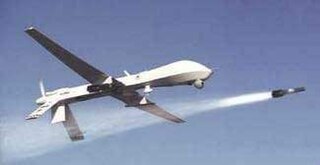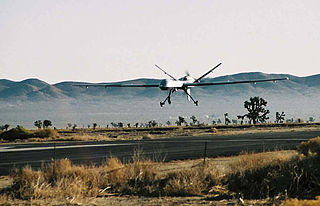In its war on terrorism in Yemen, the US government describes Yemen as "an important partner in the global war on terrorism". There have been attacks on civilian targets and tourists, and there was a cargo-plane bomb plot in 2010. Counter-terrorism operations have been conducted by the Yemeni police, the Yemeni military, and the United States Armed Forces.

An unmanned combat aerial vehicle (UCAV), also known as a combat drone or simply a drone, is an unmanned aerial vehicle (UAV) that usually carries aircraft ordnance such as missiles and is used for drone strikes. These drones are usually under real-time human control, with varying levels of autonomy. Aircraft of this type have no onboard human pilot. As the operator runs the vehicle from a remote terminal, equipment necessary for a human pilot is not needed, resulting in a lower weight and a smaller size than a manned aircraft. China, Iran, Israel, and the United States are widely recognized as industry leaders in UCAV technology. Several other countries have operational domestic UCAVs and many more have imported armed drones or have development programs underway.

Operation Enduring Freedom – Horn of Africa (OEF-HOA) is the United States military operation to combat militant Islamism and piracy in the Horn of Africa. It is one component of Operation Enduring Freedom (OEF), which includes eight African states stretching from the far northeast of the continent to the oil-rich Gulf of Guinea in the west. The other OEF mission in Africa is known as Operation Enduring Freedom – Trans Sahara (OEF-TS), which, until the creation of the new United States Africa Command, was run from the United States European Command.

Al-Qaeda in the Arabian Peninsula, or AQAP, also known as Ansar al-Sharia in Yemen, is a militant Islamist organization, primarily active in Yemen and Saudi Arabia. It was named for al-Qaeda, and states it is subordinate to that group and its now-deceased leader Osama bin Laden, a Saudi citizen of Yemeni heritage. It is considered the most active of al-Qaeda's branches, or "franchises," that emerged due to weakening central leadership. The U.S government believes AQAP to be the most dangerous al-Qaeda branch. The group established an emirate during the 2011 Yemeni Revolution, which waned in power after foreign interventions in the subsequent Yemeni Civil War.

The War on Terror, also known as the Global War on Terrorism, is an international military campaign launched by the United States government after the September 11 attacks. The targets of the campaign are primarily Sunni Islamist fundamentalist armed groups located throughout the Muslim world, with the most prominent groups being Al-Qaeda, the Islamic State, the Taliban, Tehrik-i-Taliban Pakistan, and the various franchise groups of the former two organizations. The naming of the campaign uses a metaphor of war to refer to a variety of actions that do not constitute a specific war as traditionally defined. U.S. president George W. Bush first used the term "war on terrorism" on 16 September 2001, and then "war on terror" a few days later in a formal speech to Congress. In the latter speech, George Bush stated, "Our enemy is a radical network of terrorists and every government that supports them." The term was originally used with a particular focus on countries associated with al-Qaeda. The term was immediately criticised by such people as Richard B. Myers, chairman of the Joint Chiefs of Staff, and more nuanced terms subsequently came to be used by the Bush administration to publicly define the international campaign led by the U.S. It was never used as a formal designation of U.S. operations in internal government documentation. There was a medal issued in the name of terrorism, however, the "Global War on Terrorism Service Medal".

The 2009–present phase of the Somali Civil War is concentrated in southern and central Somalia. It began in early February 2009 with the conflict between the forces of the Federal Government of Somalia, assisted by African Union peacekeeping troops, and various militant terrorist groups and factions. The violence has displaced thousands of people in the southern part of the country. The conflict has also seen fighting between the Sufi Ahlu Sunna Waljama'a and Al-Shabaab.
Since 2004, the United States government has attacked thousands of targets in Northwest Pakistan using unmanned aerial vehicles (drones) operated by the United States Air Force under the operational control of the Central Intelligence Agency's Special Activities Division. Most of these attacks are on targets in the Federally Administered Tribal Areas along the Afghan border in Northwest Pakistan.

The Disposition Matrix, informally known as a kill list, is a database of information for tracking, capturing, "rendering", or killing suspected enemies of the United States. Developed by the Obama administration beginning in 2010, it goes beyond existing kill lists and is intended to become a permanent fixture of U.S. policy. The process determining criteria for killing is not public and was heavily shaped by National Counterterrorism Director and former Central Intelligence Agency (CIA) Director John O. Brennan.

A drone strike is an attack by one or more unmanned combat aerial vehicles (UCAV) or weaponized commercial unmanned aerial vehicles (UAV).

This is a list of aviation-related events from 2014:

In response to rapid territorial gains made by the Islamic State of Iraq and the Levant (ISIL) during the first half of 2014, and its universally-condemned executions, reported human rights abuses and the fear of further spillovers of the Syrian Civil War, many states began to intervene against it in both the Syrian Civil War and the Iraqi Civil War. Later, there were also minor interventions by some states against ISIL-affiliated groups in Nigeria and Libya.
This is a list of aviation-related events from 2015:
Since the September 11 attacks, the United States government has carried out drone strikes in Pakistan, Yemen, Somalia, Afghanistan, and Libya.

The Yemeni Civil War is an ongoing conflict that began in 2015 between two factions: the Abdrabbuh Mansur Hadi led Yemeni government and the Houthi armed movement, along with their supporters and allies. Both claim to constitute the official government of Yemen.
This is a list of aviation-related events from 2016:

Since November 2015, the United States and allies have carried out a large series of both airstrikes and drone strikes to assist Libya in its revived conflict in support of the Tripoli-based Government of National Accord against the ISIL presence in the region.

Since 2007, the United States Military has targeted militant groups, mainly Al-Shabaab, within Somalia using airstrikes including targeted drone strikes and missiles launched from naval ships alongside special forces raids and advising. Since March 2017, airstrikes have ramped up dramatically under the Trump administration. Airstrikes also began targeting the Islamic State in 2017.













